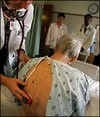New York Times on the experience of being a patient
Awash in information, patients face a lonely, uncertain road (14 August 2005 – Permanent link)
A generation ago, patients argued for more information, more choice and more say about treatment. To a great extent, that is exactly what they have received: a superabundance of information, often several treatment options and the right to choose among them.
As this new responsibility dawns on patients, some embrace it with a sense of pride and furious determination. But many find the job of being a modern patient, with its slog through medical uncertainty, to be lonely, frightening and overwhelming.
Patients turn to advocates, support groups and e-mail, too (14 August 2005)
Battle-hardened by the medical system, patients have become pretty good at taking care of one another. If they are not learning enough from their doctors about diagnoses and treatment options, they can turn to organisations that offer support and education programs for specific illnesses. Doctors can often make recommendations about which of these groups are reliable.
In the hospital, a degrading shift from person to patient (16 August 2005 – Permanent link)
Entering the medical system, whether a hospital, a nursing home or a clinic, is often degrading. In interviews and surveys, people who have recently received medical care say that even when they benefit from the expertise of first-rate doctors, they often feel resentful, helpless and dehumanised in the process.
“The point is that when they talk about quality of health care, patients mean something entirely different than experts do,” said Dr. Drew Altman, president of the Kaiser Foundation. “They’re not talking about numbers or outcomes but about their own human experience, which is a combination of cost, paperwork and what I’ll call the hassle factor, the impersonal nature of the care.”
Essential but uncommon knowledge: Patients have many rights. Just ask. (16 August 2005)
You can refuse treatment. You can almost always leave when you are ready to. You can demand to know the name of anyone who enters your room. You may be able to have better food – and even wine – brought in from outside. In many cases, you can ditch the hospital gown and wear your own clothes.
Sick and scared, and waiting, waiting, waiting (20 August 2005 – Permanent link)
Waiting has long been part of medicine. Patients like Ms. Odlum wait for test results; others spend weeks or months waiting for appointments or stranded for hours in doctors’ waiting rooms. But health care researchers say the waiting problem has only gotten worse. Advances in technology have created more tests and procedures to wait for, and new drugs and treatments mean more people need more doctor visits.
Alone in Illness, Seeking Steady Arm to Lean On (26 August 2005 – Permanent link)
There is no way to calculate how many Americans of all ages living alone happen to be sick or disabled, but hospital discharge planners and home health care agencies say they are serving more single people without an obvious person to look after them.
Where to Get Help in Planning for Illness (26 August 2005)
To be ill and alone requires far more advanced planning than is required of those who live with their families. It is a predicament poorly understood by health care providers, who are likely to advise hiring a home health aid or other professional.
Related: IDEO’s design cure – [Metropolis, October 2002] (pdf, 828 kb)




